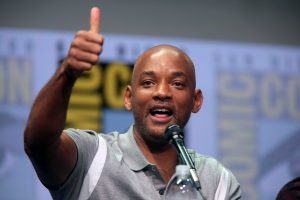
By Matthew Dillon
Directed by Suicide Squad’s David Ayer, Netflix exclusive Bright is a buddy cop movie in which human police officer Ward (Will Smith) and orc cop Jakoby (Joel Edgerton) must patrol a fantasy creature filled Los Angeles.
Juxtaposing Tolkien and fairy tale mythologies into a contemporary setting is far from a new idea, considering the entire “Urban Fantasy” subgenre centers on the concept. But that popular storytelling convention has somehow never made its way into a mainstream film. While ideally Bright should stick to exploring its admittedly tantalizing world, it gets too caught up with doomsday cult plots, buddy cop clichés, and ill-conceived social commentary to do anything meaningful with it.
Like many Urban Fantasy stories, Bright tries to use its mystical elements to talk about delicate social issues, namely racism and police brutality. This film’s approach to that has proven to be very controversial and rightfully so. Admittedly, it is not alone. The only instance I can think of where this sort of metaphor was handled well was Terry Pratchett’s Discworld books. Even then, I am sure someone can take umbrage with his approach to those sensitive topics. Bright does not come anywhere near that level of thoughtfulness, as it is often outright offensive thanks to some very poorly thought out scenes and dialogue. Regardless, if you believe that orcs and elves can be used to discuss something like racism, Bright is too shallow to do it properly.
Even outside of its competition and failure at being socially aware, Bright is a major waste and a derivative one at that. Any chances at telling an engaging story are cast aside in favor of a half-baked “prophecy” plotline, which relies heavily on world building they forgot to put in. This series of magical shootouts and kung-fu elves displaces the film’s more promising elements, namely the depiction of a mundanely magical Los Angeles, with nice background details like a centaur police officer and a dragon casually weaving through the skyline. Besides the typical fantasy inspirations, Bright has strong similarities to Luc Besson’s The Fifth Element and most bizarrely the Whoopi Goldberg direct to video flop Theodore Rex.
Bright’s greatest strength and weakness is found in its two protagonists. Orc cop Jakoby is a genuinely likable character who hoards most of the film’s good lines and moments with a charismatic performance. Jakoby comes off as a “real” fantasy creature with believable motivations, rather than a plot device or special effect. By the same note, Will Smith’s role as officer Ward is forgettable, even for an actor who is phoned in nearly every performance for the last decade. Bright limits itself by literally reshaping its world to accommodate Smith’s role, which is indistinguishable from his legion of identical performances in other movies. Will Smith manages to shatter the believability of Bright’s fantasy world and ruins whatever amount of immersion it managed to create.
On a technical level, Bright is as much of a mixed bag as every other David Ayer movie. The director’s visual and narrative style is best described as “trashy, neon drenched urban hell.” It is reminiscent of much smarter films’ aesthetics, albeit without their irony or nuance. The fight scenes are all over the place, as some carry a magnetic energy while others are weightless and forgettable. This is best reflected, or perhaps even caused by the similar variety found in the fantastic elements’ representation and sound editing, which ranges from clever to nonexistent. Bright at least manages to paint a convincing image of magic as a destructive force through the clever usage of certain effects and techniques, to the point where it stands as one of the more original elements of the film.
Bright does not feel like a finished product, as its few graces are pitted against its obsession with being a mediocre buddy cop flick and its garbled commentary. Bright does have more potential than one might think, so hopefully its recently announced sequel will learn from those mistakes.




































































































































































































